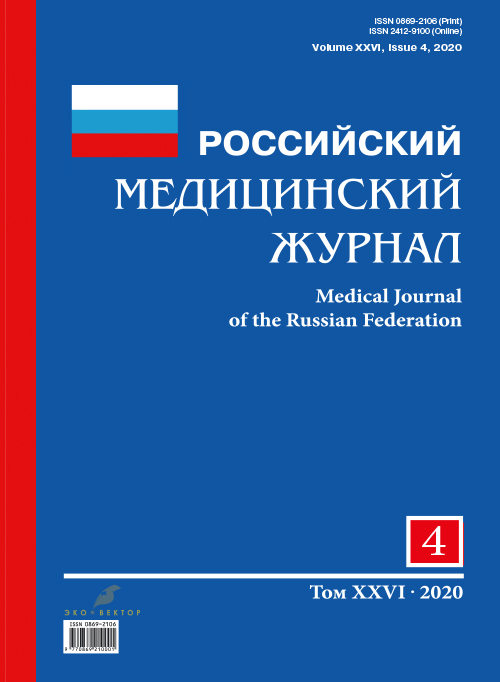Monitoring the opinions of resident physicians on the state of healthcare system, quality of medical care, and readiness for professional activity in current conditions
- Authors: Kasimovskaya N.A.1
-
Affiliations:
- I.M. Sechenov First Moscow State Medical University (Sechenov University)
- Issue: Vol 26, No 4 (2020)
- Pages: 205-210
- Section: Health care organization and public health
- Submitted: 09.10.2020
- Accepted: 09.10.2020
- Published: 09.10.2020
- URL: https://medjrf.com/0869-2106/article/view/46588
- DOI: https://doi.org/10.17816/0869-2106-2020-26-4-205-210
- ID: 46588
Cite item
Abstract
Despite the ongoing reforms, the staff shortage in the healthcare system and the loss of medical personnel in the field still negatively affect the quality of medical care. The article presents the results of monitoring the opinions of future resident physicians of the current organization and the quality of medical care and their readiness for professional activity, as well as their views to the healthcare system needs. It has been established that every third graduate was not ready for the profession before entering the residency, 36.7% considered their future profession to be nonprestigious, only half of the residents (50.3%) considered the medical profession to be highly paid, and personal aptitude (53%) and abilities (40%) were considered the leading factors in choosing the profession. The residents evaluated the quality of medical care at a high level only in a clinical setting (69.7%), and they do not plan to work in regional health care but prefer to stay in Moscow (60.3%). To preserve the healthcare system human resources, it is advisable to develop a program for managing risk factors for the professional environment, starting with training of personnel at the institute of higher education.
Full Text
About the authors
Nataliya A. Kasimovskaya
I.M. Sechenov First Moscow State Medical University (Sechenov University)
Author for correspondence.
Email: kasim0307@mail.ru
ORCID iD: 0000-0002-1046-4349
candidate of medical sciences, associate Professor, head of the Department. Department of nursing management and social work of the Institute of psychological and social work “I.M. Sechenov First Moscow State Medical University (Sechenov University)”
Russian Federation, MoscowReferences
- Lindenbraten A.L., Grishina N.K., Kovaleva V.V., Zagoruichen¬ko A.A., Golovina S.M., Gridnev O.V. On the issue of improving the quality of primary healthcare in Moscow. Byulleten’ Natsional’nogo NII obshchestvennogo zdorov’ya im. N.A. Semashko. 2015;(4–5): 159–68. (in Russian)
- Shchepin V.O., Dyachkova A.S. Modern approaches to the development of primary specialized health care. Byulleten’ Natsional’nogo NII obshchestvennogo zdorov’ya im. N.A. Semashko. 2013;(1):379–82. (in Russian)
- Shchepin V.O. Medical and preventive assistance to the population of the Russian Federation: resources of support and main indicators of activity. Problemy sotsial’noy gigieny, zdravookhraneniya i istorii meditsiny. 2009;(7):3–6. (in Russian)
- Belostotsky A.V., Gridnev O.V., Grishina N.K., Zachkova E.A. Current issues of human resource development in healthcare. Problemy sotsial’noy gigieny, zdravookhraneniya i istorii meditsiny. 2016; 24(4):230–5. (in Russian) doi: 10.1016/0869-866X-2016-24-4-230-235.
- Kakorina E.P. Some results of the evaluation of the effectiveness of the health system in 2010. Menedzher zdravookhraneniya. 2011; (10):6–11. (in Russian)
- Belostotsky A.V., Gridnev O.V., Grishina N.K., Zachkova E.A. Topical issues of human resource development in healthcare. Problemy sotsial’noy gigieny, zdravookhraneniya i istorii meditsiny. 2016; 24(4):230–5. (in Russian) doi: 10.1016/0869-866X-2016-24-4-230-235.
- Revskaya I.A. Technologization of management of professional development of personnel of medical organizations. Issledovaniya i praktika v meditsine: nauchno-prakticheskiy zhurnal, 2016;3(1): 79–83. (in Russian)
- Sheiman I.M. HR policy in healthcare: comparative analysis of Russian and international practice. Voprosy gosudarstvennogo i munitsipal’nogo upravleniya, 2015;(1):143–67. (in Russian)
- Reshetnikov V.A., Korshever N.G., Dorovskaya A.I. Regularities of career growth of doctors in medical organizations. Siberian medical review. 2015;(4):61–6. (in Russian)
- Saltman R.B., Figueras J. European health care reform. Analysis of current strategies: Translated from English. [Reformy sistemy zdravookhraneniya v Evrope. Analiz sovremennykh strategii]. Moscow: GEOTAR Meditsina; 2012. (in Russian)
- Piven’ D.V., Kitsul I.S. on the formation of a new system of quality control and safety of medical activities in the health care of the Russian Federation. Menedzher zdravookhraneniya. 2013;(2):16–26. (in Russian)
- Shevsky V.I., Sheiman I.M. Methodological approaches to the prospective assessment of the need for medical personnel. Zdravo¬okh¬ranenie. 2015;(3):62–72. (in Russian)
- Shevsky V.I., Sheiman I.M. Methodological approaches to the prospective assessment of the need for medical personnel. Zdravo¬okh¬ranenie. 2015;(4):58-70. (in Russian)
- Sheiman I.M., Shevsky V.I. HR policy in healthcare: comparative analysis of Russian and international practice. Voprosy gosu¬dar¬¬stvennogo i munitsipal’nogo upravleniya. 2015;(1):143–67. (in Russian)
- Kudelina O.V., Kislyakova E.Yu. Problems of management and de¬velopment of human resources of the healthcare system. Inter¬na¬¬tional experience. Ekologiya cheloveka. 2018;(8):17–27. (in Russian)
- WHO. Global strategy on human resources for health: workforce 2030. Geneva: World Health Organization; 2016.
- Campbell J., Dussault G., Buchan J., Pozo-Martin F., Guerra Arias M., Leone C. et al. A universal truth: no health without a workforce. Forum report, Third Global Forum on Human Resources for Health, Recife, Brazil. In: Global Health Workforce Alliance. Human resources for health: foundation for Universal Health Co¬verage and the post-2015 development agenda. Report of the Third Global Forum on Human Resources for Health. Geneva: Global Health Workforce Alliance and World Health Organization; 2013.
- Global Health Workforce Alliance. Human Resources for Health: foundation for Universal Health Coverage and the post-2015 de¬velopment agenda. Geneva: World Health Organization; 2014. 70 p.
- In regions, a shortage of doctors was registered. Gazeta RBK. 2020 February 6:004(3171). Available at: https://www.rbc.ru/newspaper/2020/02/06/5e39418c9a794713cb0a26bd (accessed 6 February 2020). (in Russian)
- Nesterkin M. Medical personnel deficit will be eliminated by the private sector capacity. Medvestnik. Portal of the Russian doctor. Available at: https://medvestnik.ru/content/news/Kadrovyi-deficit-v-zdravoohranenii-likvidiruut-za-schet-chastnogo-sektora.html (accessed 10 February 2020). (in Russian)
- Sergeeva N.M. Motivation of medical staff as a factor in the development of health facilities. Innov: elektronnyi nauchnyi zhurnal. 2017;(3). Available at: http://www.innov.ru/science/economy/motivatsiya-meditsinskikh-kadrov-ka/ (accessed 15 February 2020). (in Russian)
- Kudelina O.V., Brazovskaya N.G. Advancing workforce management systems of healthcare institutions. Sotsial’nye aspekty zdorov’ya naseleniya. 2016;52(6):11. (in Russian) doi: 10.21045/2071-5021-2016-52-6-11.
Supplementary files









